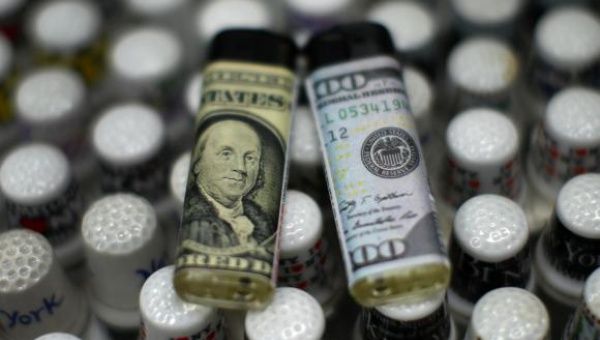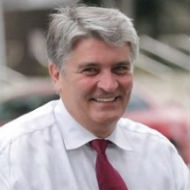 Reuters.Former UBS banker Raoul Weil, who is on bail, arrives for his trial at federal court in Fort Lauderdale, Florida, October 20, 2014. Raoul Weil, 54, who headed wealth management at Zurich-based UBS until his indictment, is charged in a Fort Lauderdale federal court with helping thousands of US taxpayers hide up to $20 billion in assets in offshore accounts. Weil, facing up to five years in prison if convicted, is by far the highest-ranking Swiss banker to be charged in the United States. His trial culminates a more than 7-year battle with Switzerland on the abuse of its bank secrecy laws to help Americans avoid paying billions of dollars in taxes.
Reuters.Former UBS banker Raoul Weil, who is on bail, arrives for his trial at federal court in Fort Lauderdale, Florida, October 20, 2014. Raoul Weil, 54, who headed wealth management at Zurich-based UBS until his indictment, is charged in a Fort Lauderdale federal court with helping thousands of US taxpayers hide up to $20 billion in assets in offshore accounts. Weil, facing up to five years in prison if convicted, is by far the highest-ranking Swiss banker to be charged in the United States. His trial culminates a more than 7-year battle with Switzerland on the abuse of its bank secrecy laws to help Americans avoid paying billions of dollars in taxes.
November 2 2014 at 01:48pm
By Reuters
Fort Lauderdale, Florida/Zurich - From bundles of cash inside scraps of newspaper to setting up shell companies, the trial in Florida of a former UBS executive is a reminder of the extreme methods some Swiss bankers used to hide clients' cash.
Raoul Weil, 54, is the highest ranking Swiss banker to be arrested in the United States and prosecutors are seeking to paint him as a facilitator of efforts that helped conceal up to $20 billion (R221 billion) in taxpayers' assets in secret offshore accounts.
Weil's main defence has been that these efforts were done by people below him and that the US cross border business was a tiny fraction of his overall responsibilities.
If convicted, Weil faces up to five years in prison for conspiracy to commit tax fraud.
Weil and his attorneys declined comment on the trial.
At the trial, which pits Weil against several former UBS colleagues who have chosen to cooperate with US authorities in exchange for favourable sentencing, Swiss bankers have testified about using an arsenal of James Bond-like tactics to avoid detection while in the United States, and to help US clients keep their accounts hidden from tax authorities.
Bankers were given laptops with two hard drives, Hansruedi Schumacher, who formerly ran UBS' cross-border business, told the trial, which began on October 14 and is expected to run for about four weeks.
One hard drive was filled with anything from family photos and personal emails while another contained a password-protected database with the US citizens' code-named bank records.
Another witness said the drive with the bank details could be wiped simply by typing in a short password.
“It was known all those account holders were not paying their taxes, and for the Swiss bank it was a very profitable business,” Schumacher said during testimony at the trial.
Eskander Ensafi, who banked with UBS, told the court about a clandestine meeting in 2005 at a Los Angeles hotel with bank adviser Claude Ullman.
The adviser handed him roughly $50,000 in US bills wrapped in newspaper, Ensafi testified, tax-free interest from a Swiss bank account in the name of Ensafi's father, who had just suffered a debilitating stroke.
Ullman was sued by a number of US individuals - who were jailed for not paying US taxes by hiding their money in Swiss bank accounts - for alleged racketeering, along with UBS and a number of high ranking bankers, including Weil, in a 2009 lawsuit in the Eastern District of California.
The case was dismissed with prejudice in September 2014.
An attorney for Ullman did not respond to a request for an update on the case.
German businessman Juergen Homann, 72, who pleaded guilty to a US charge of failing to report a foreign account to the Internal Revenue Service (IRS) in 2009, told the court one UBS client adviser, Hans Thomann, helped him set up a Hong Kong-based shell company.
The company, the Prodon Foundation, was then used to funnel income Homann made from his raw minerals business venture in China.
Attempts to reach Thomann for comment were unsuccessful.
In 2012, he was charged in the Southern District of New York with conspiracy to defraud the United States and conducting an unlicensed money transmitting business.
SHADOW OF SECRECY
Switzerland's biggest banks have paid a heavy price to settle their US tax evasion cases.
UBS admitted to helping US taxpayers hide money and paid a $780 million fine in 2009, while Credit Suisse pleaded guilty in May to a US criminal charge and will pay more than $2.5 billion in penalties.
Since US authorities began to chip away at the wall of Swiss banking secrecy in 2008, details have trickled out of the extraordinary lengths bankers would go to in order to smuggle assets in and out of the United States.
A US Senate report published earlier this year described how a customer at Swiss bank Credit Suisse was given statements tucked into the pages of an issue of Sports Illustrated magazine at a hotel meeting.
Former UBS financial adviser Bradley Birkenfeld admitted in 2008 to smuggling diamonds in a tube of toothpaste for a client.
Birkenfeld was a whistleblower in the tax fraud case against UBS and won a record-setting $104 million reward from the US Internal Revenue Service.
On top of the fines forked out by Switzerland's two biggest banks, about a dozen smaller Swiss players are still under US criminal investigation and face serious penalties, while many more have joined a government-brokered programme allowing them to make amends if they aided tax evasion by wealthy Americans.
The United States is not the only jurisdiction that has cracked down on tax evasion by its wealthiest citizens.
UBS is under investigation in France over whether it helped wealthy individuals there dodge taxes.
Investigating magistrates have proposed that UBS pay a fine of 4.88 billion euros ($6.2 billion), according to a judicial source.
The bank also booked a near-$300 million charge in the second quarter of this year, mainly to settle claims it helped wealthy Germans evade taxes.
The bankers who helped move clients' money around undetected are themselves faced with a legal bind that goes beyond financial penalties.
Since 2009, the US Justice Department has charged more than 30 bankers and advisers in the offshore investigation, including several Swiss bankers set to testify at Weil's trial, while others have been arrested by European authorities.
In some cases, the accused can cooperate with foreign authorities in exchange for lighter penalties.
However, such a move could put them at risk of violating Swiss banking secrecy laws, an offence punishable by up to three years in prison and a fine of up to 250,000 Swiss francs ($262,000).
Failure to cooperate, though, can expose the bankers to the danger of being detained by foreign authorities whenever they leave Switzerland. - Reuters


